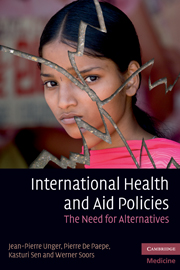Book contents
- Frontmatter
- Contents
- Preface
- Biographies
- Notices
- Acknowledgements
- List of abbreviations
- Reviews
- Introduction: Overview and purpose
- Section 1 Paradigms of international policies
- Section 2 The failure of the aid paradigm: poor disease control in developing countries
- Section 3 Impact of international health policies on access to health in middle-income countries: some experiences from Latin America
- Section 4 Determinants and implications of new liberal health policies: the case of India, China and Lebanon
- 9 Political and economic determinants of health care systems: the case of India
- 10 An economic insight into health care provision in six Chinese counties: equity in crisis?
- 11 Health care financing and delivery in the context of conflict and crisis: the case of Lebanon
- Section 5 Principles for alternative, publicly oriented health care policies, planning, management and delivery
- Section 6 A public health, strategic toolkit to implement these alternatives
- Conclusions
- Glossary
- Index
- References
11 - Health care financing and delivery in the context of conflict and crisis: the case of Lebanon
Published online by Cambridge University Press: 06 December 2010
- Frontmatter
- Contents
- Preface
- Biographies
- Notices
- Acknowledgements
- List of abbreviations
- Reviews
- Introduction: Overview and purpose
- Section 1 Paradigms of international policies
- Section 2 The failure of the aid paradigm: poor disease control in developing countries
- Section 3 Impact of international health policies on access to health in middle-income countries: some experiences from Latin America
- Section 4 Determinants and implications of new liberal health policies: the case of India, China and Lebanon
- 9 Political and economic determinants of health care systems: the case of India
- 10 An economic insight into health care provision in six Chinese counties: equity in crisis?
- 11 Health care financing and delivery in the context of conflict and crisis: the case of Lebanon
- Section 5 Principles for alternative, publicly oriented health care policies, planning, management and delivery
- Section 6 A public health, strategic toolkit to implement these alternatives
- Conclusions
- Glossary
- Index
- References
Summary
Adapted from: Sen, Kasturi and Sibai, Abla (2004). Transnational Capital and Confessional Politics: the Paradox of the Health care system in Lebanon. International Journal of Health Services, Volume 34, Nov. 3 2004. pp. 527–551.
Regional background – The Mashreq
Many countries in the Arab world promised education and health care free for all, as part of the post independence revival of nationalism. However, a variety of factors prevented the development of universal access to health care. These include the high proportion of countries in the region experiencing some sort of conflict: capital flight, a poor tax base and dependence on donor assistance. There has also been a significant effect on the ability to deliver this promise due to the existence of oil-rich Gulf cooperation countries, whose high-tech, high-cost medical priorities, have an impact on the nature of health services in other countries of the region, through migratory flows and economic cooperation.
A focus on specialized rather than comprehensive care has also been encouraged by donors, most notably the WB among others, through the doctrine of privatization and contracting out of health services, that has led to specialization often to the detriment of access and equitable distribution of services (Kronfol, 2002).
Moreover, observers note that, in a majority of countries of the Mashreq region (the Arab-speaking world stretching from east of Egypt to north of the Arabian peninsular), civil society organization is weak and often unable to place pressure on their respective governments for the basic rights of citizens (Jabbour et al., 2006).
- Type
- Chapter
- Information
- International Health and Aid PoliciesThe Need for Alternatives, pp. 138 - 152Publisher: Cambridge University PressPrint publication year: 2010



